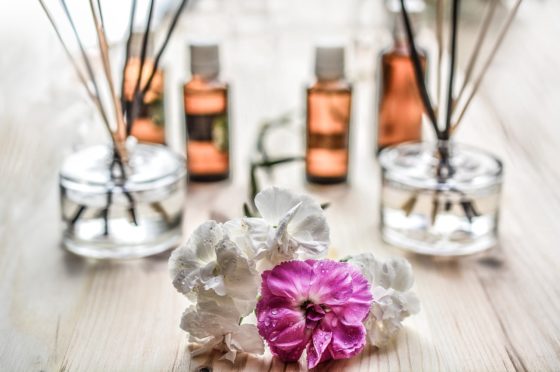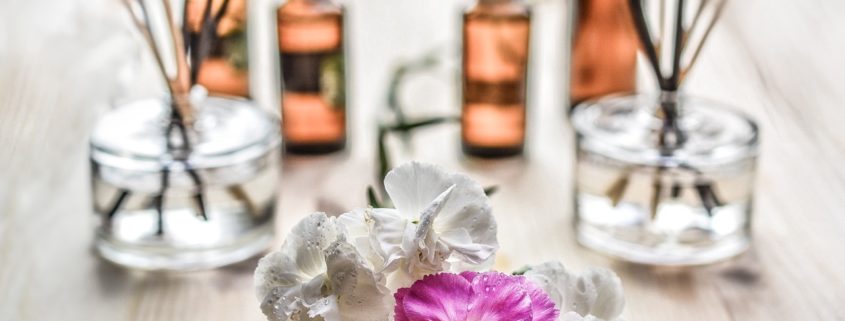Aromatherapy During Pregnancy: Which Oils are Safe to Use?

In this post, we’ll pinpoint the essential oils that are safe and look at which pregnancy-related ailments they may help treat. We’ll also blacklist the oils that you should avoid due to their potentially harmful effects on your baby.
Contents
The Benefits of Aromatherapy During Pregnancy
Essential oils are derived from plants and flowers, making them a natural addition to your holistic health rituals. Since the era of Ancient Egypt, people have used essential oils for both beauty and well-being purposes.
From a natural cure for anxiety to a preventative measure against cancer, essential oils present a host of possible benefits. During the physically and emotionally challenging months of pregnancy, the oils can be even more beneficial if used properly.
Before You Use Essential Oils When Pregnant
Whichever essential oil you select, make sure to dilute it with a base oil before applying on your bare skin. Base oils, like sweet almond and grapeseed, mix with the essential oil to form a blend that is safe for direct contact with skin. Undiluted essential oils are potent and may even be toxic in high levels of concentration. Pharmaceutical chemistry professor Gerhard Buchbauer asserts that “the absorption of essential oils by the nose is as fast as an intravenous injection.”
In fact, it takes 220 pounds of lavender flowers to make one pound of essential oil! So, be sure to use your essential-oil blend sparingly; just a drop or two may be enough to experience the benefits. You may want to test a very tiny amount of oil, smaller than a teardrop, on your skin to see if you have any allergies or other adverse reactions. Discussing an aromatherapy plan with your physician is also advisable.
Finally, keep your pets out of the room when you use any essential oil. Cats and dogs have experienced fatal reactions to some essential oils, so protect your furry family.
See also: Immune System Boost for Baby? Get a Dog
Lavender Oil for Relaxation
Queen of the essential oils, lavender has a sweet yet soft scent that is known for calming a racing mind. Studies have indicated that lavender oil may even help ease pain after surgery, making it a good option for mothers who have undergone C-sections. You may receive some benefits from this fragrance by using it in an infused soap or body wash.
Citrus Oils for Mood Boosting
Refreshing citrus oils like lemon, lime, and mandarin may assist in beating the pregnancy and postpartum blues. At the same time, citrus oils have antiviral and antibacterial properties that could boost your immune system as well as your mood. If you don’t have a bottle of essential oil handy, snacking on fresh orange and grapefruit slices will provide even more health benefits with a whopping dose of Vitamin C.
Peppermint Oil for Headaches and Nausea
This potent oil opens your sinuses, relieving pressure and allowing for a smoother flow of blood. Consequently, headaches and migraines that present with nausea may be eased. Sucking on a peppermint candy or sipping peppermint tea may give similar relief for headaches. Lemon also has been shown to reduce nausea and vomiting during pregnancy.
See also: Have Severe Morning Sickness? It May Be Hyperemesis Gravidarum
Other Oils Safe to Use During Pregnancy
There are many other essential oils available for your safe use during pregnancy. Ylang ylang and chamomile, for example, offer relaxing benefits similar to lavender oil — however, some types of chamomile are definitely unsafe during pregnancy and can even lead to miscarriage, so please consult with your doctor and read all safety labels to be sure.
Eucalyptus oil is touted for its antiseptic and antifungal properties, while sandalwood is anti-inflammatory, making it good for your skin in small diluted amounts. Be careful with anti-inflammatories in general, though. There are specific medicines to avoid during pregnancy, including non-steroidal anti-inflammatory drugs (NSAIDs), so again, check with your doctor before starting an aromatherapy regimen.
Essential Oils to Avoid During Pregnancy
The National Association for Holistic Aromatherapy (NAHA) warns about the potentially hazardous effects of several essential oils during pregnancy. NAHA specifically cautions against a handful of essential oils, including sage and wintergreen, that may cause uterine contractions leading to miscarriage or premature labor. Furthermore, NAHA advises avoiding these oils even after childbirth when you may be breastfeeding.
Other blacklisted oils include juniper berry (which may harm your kidneys) and basil (which could cause abnormal cell development in your unborn baby). When in doubt about a particular oil, or any aspect of maintaining a healthy pregnancy, always consult with your doctor.
How to Safely Use Aromatherapy During Pregnancy
Aromatherapy can be an integral part of your feel-good rituals during pregnancy if you adhere to a few basic rules:
- Only use essential oils during the second and third trimesters.
- Carefully select an appropriate essential oil and dilute it before usage.
- Check with your doctor that aromatherapy is safe for you.
Experts also recommend that you mix and match oils, not using any one scent too intensively. So, one week you may rub a drop of diluted peppermint oil on your forehead to ease a tension headache, and the next week you may breathe in a mist of diluted lavender oil through a diffuser to tame anxiety.
When used with caution, aromatherapy during pregnancy can lead you on an adventure that is both calming and invigorating!








Leave a Reply
Want to join the discussion?Feel free to contribute!